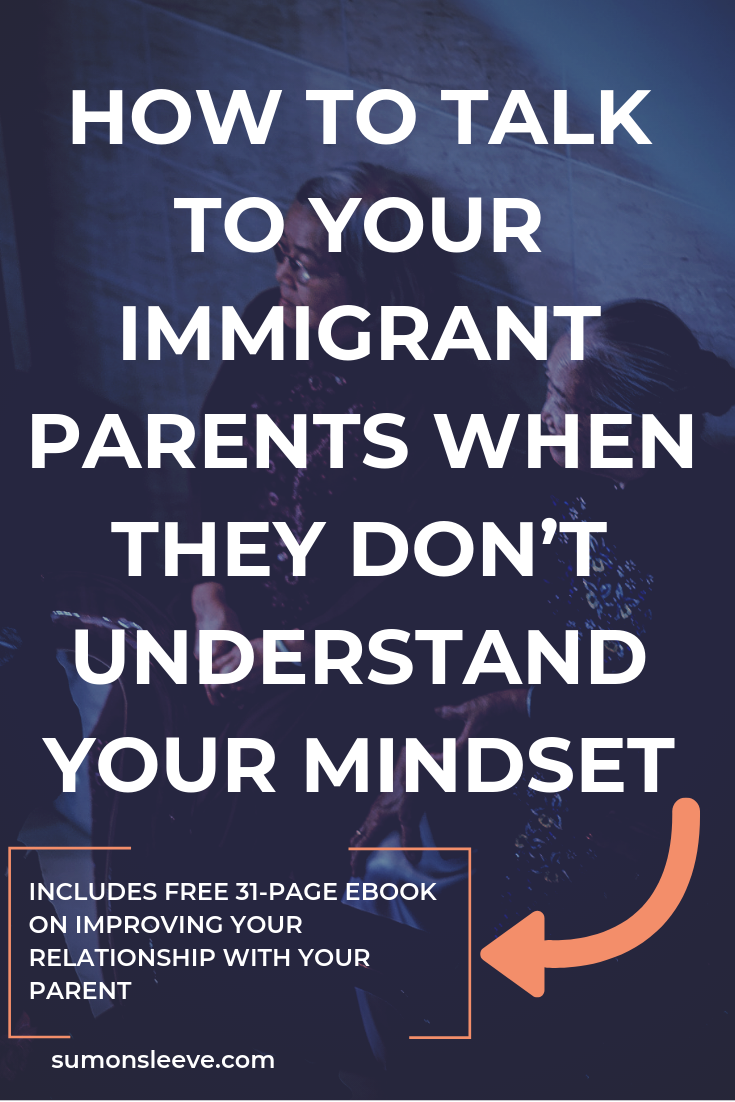
Asian immigrant parents don’t share our mindset. They grew up differently than us. How can we talk to them when they don’t understand you?
Now that you’ve taken some time to think about why and what you want to improve in your relationship with your parents. How do you actually do it? Where do you even begin?
**Click Below To Listen**
Click for Step 1 (Why?)
Click for Step 2 (What?)
Click for Step 4 (When?)
Click for Step 5 (Who?)

One day, I just sat my dad down and said,
“OK so I hate you but I think we should know each other better before you die. I also need you to tell me why you’re such an asshole so I don’t become an asshole like you one day.”
Right…I’m kidding. I did not say that. Because that would have ended well…not (Borat)
Maybe you don’t really know how to start because in those moments when you’re in their presence, the way they treat you and your reaction to their actions and words prevent you from wanting to have meaningful conversations.
You just don’t have the patience for it.
Ain’t nobody got time for that.
It’s like that comment they made about your career, your boyfriend, the number of chicken wings you’re eating, your hair, your clothes or whatever…made you so annoyed and angry that you would rather yell at them (telling them they’re stupid), ignore them (biting your tongue) or leave (so you can vent to your friend/sibling/partner/Reddit after).
How can you have a decent, civilized conversation if you’re feeling on edge every time you’re around them?
Earlier this year, I was picking my daughter up from my parents. My dad casually asked me what I was having for dinner that night. I told him that my husband made beef brisket.
He then scolded me,
“You guys eat too much beef. It is not good for you. She (points to my daughter) needs to eat more vegetables. It’s better for her. I will make sure she eats vegetables at my house.”
OK, so I didn’t yell at him
I really really wanted to but I didn’t.
However, I firmly corrected him and defended myself,
“We are also having vegetables. We just happened to make a beef dish tonight. I make tofu and fish dishes all the time.”
He shrugged (obviously, not validating my feelings or showing he understood). Then I left and went home to vent to my husband, going over all the assumptions my dad had made about me.
First, he criticized my family’s diet even though I have a Graduate degree in Health Sciences, certified in nutrition, worked in healthcare for 10 plus years, plus my history of disordered eating which he is aware of…blah blah blah.
Next, he judged my ability to take care of my daughter, making assumptions that I am a lousy mother for feeding her beef.
Lastly, he compared his parenting abilities against mine by saying he is more capable because he feeds vegetables to my child (as though I do not…scoff).
So yes, I was frustrated and didn’t know what to say to him. But with these kinds of moments, I tend to forget and those feelings get buried somewhere, festering like a canker sore that never heals.
I should have asked myself,
“What else do I need to know about him so I understand why he said that to me?”
But I didn’t…until a month later.
We were having a family dinner at a restaurant. We were trying to decide whether to order a chicken or beef dish.
I wanted beef.
Then my dad makes an overarching blanket statement,
“Historically, our family doesn’t much beef”
I was in a better mood this time (maybe it was that blissful time after my period). I also had my husband and sister around the table. This was my opportunity to get to know him better, to get some closure on that annoying comment.
I asked,
“Really? I didn’t know that. What family history? What’s the story behind that?”
My dad goes into storytelling mode.
Long story short…my dad’s dad (my grandpa) was raised on a farm. My grandpa felt that because the cows worked so hard every day that it was cruel to eat them.
He didn’t have the heart (or the stomach) to consume such a dedicated animal. And that’s how my dad was raised. He didn’t eat a lot of beef.
Ah, so that makes more sense as to why my dad made that comment a month earlier.
He wasn’t judging me as a mother. He wasn’t comparing his parenting capabilities to mine. He was merely trying to instill his own family values around eating beef to his granddaughter. I always knew he was traditional so this further validates what I know about him, helping to heal that canker sore.
So step 3 is about how to initiate that first difficult conversation that would hopefully lead to a better relationship with your parents.
Overall, it’s about finding the right moment when you’re not feeling on edge.
Some suggestions:
Maybe you’re feeling blissed out from an awesome vacation?
Maybe it’s that perfect time in your hormonal cycle?
Maybe you just had a really good week at work and nothing can bring you down?
When is the next time you’ll see or talk to your parents?
Maybe bring it up after dinner when you’re all sitting around having fruit?
Turn off the TV/radio/screens so there’s no distraction
Put the kids in some activity that will keep them occupied for a while
If you’re a forgetful person, keep a notepad handy or have your phone ready with your questions and key messages.
Is there someone you trust who can be your emotional support/witness when having this conversation? Maybe your sibling? Partner? Let them know what you’re hoping to do. Share with them your questions. Ask them if they’d like to come for dinner (or maybe they already are).
Is there someone more fluent in your parents’ native language?
Maybe they could help translate your questions/key messages beforehand?
An Aunt?
Uncle?
Family Friend?
Close Friend?
Would your parents feel comfortable having this person at dinner when you talk about your topic? If so, invite them to dinner. Or you could use Google Translate.
Mentally prepare yourself:
Prepare to be open-minded.
Prepare to get frustrated.
Prepare to be vulnerable.
Prepare to have courage.
Prepare to be annoyed.
Prepare to be stressed.
Prepare to be anxious.
Prepare to be scared.
Prepare to be surprised.
Prepare to be nervous.
Prepare to be relieved.
It’s completely natural to feel these things when it’s something you’ve never done before.
Click for Step 1 (Why?)
Click for Step 2 (What?)
Click for Step 4 (When?)
Click for Step 5 (Who?)




